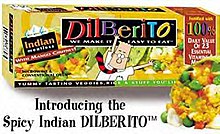
The Dilberito was a vegetarian microwave burrito introduced in 1999 by Scott Adams Foods, Inc. and named after the comic strip character Dilbert. The product went out of production in 2003. [1]
Contents
First announced in The Dilbert Future and introduced in 1999, [2] the Dilberito came in flavors of Mexican, Indian, Barbecue, and Garlic & Herb. It was sold through some health food stores.